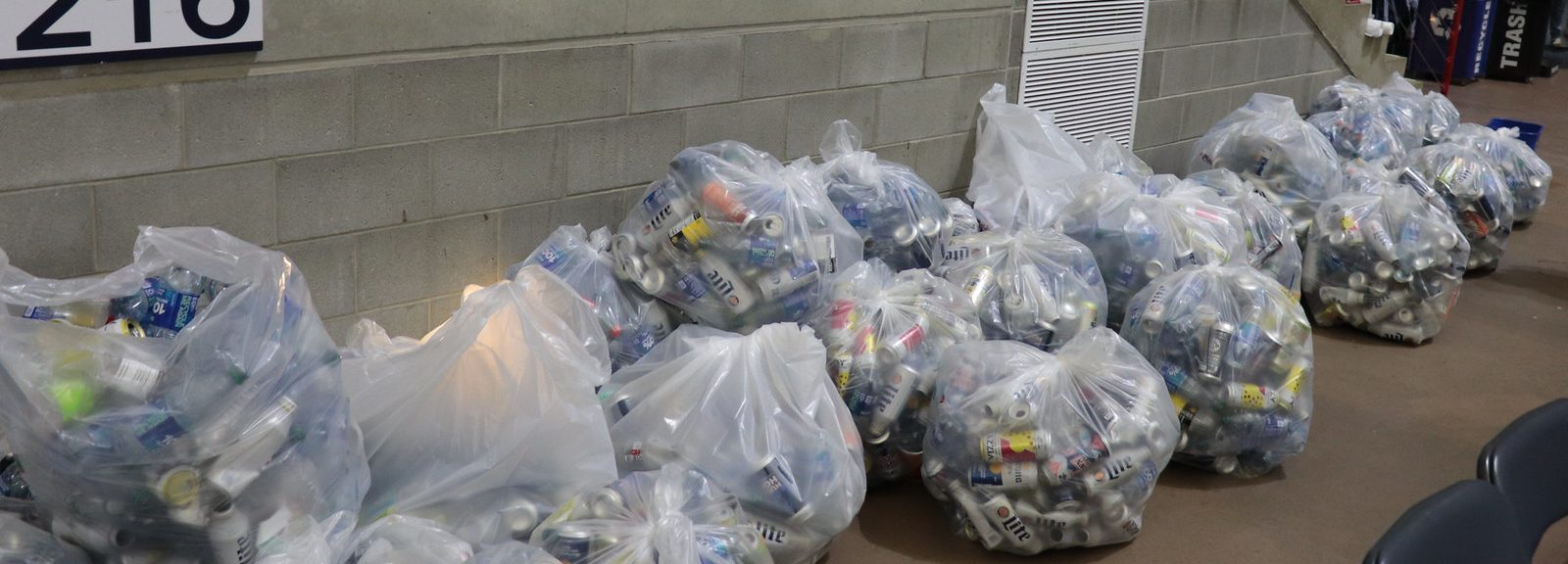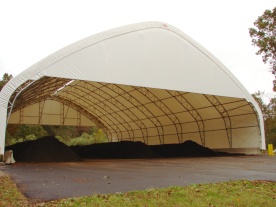
Waste and Recycling
PLAN Zero Waste Stage 1 Report
In the Spring of 2020, the Office of Sustainability partnered with the Post-Landfill Action Network (PLAN) to conduct a large-scale audit of our Storrs campus’ waste management practices. Our intern team interviewed staff representing a wide range of departments at UConn to get a clear picture of how and where waste is generated across campus on a day-to-day basis. As a result, PLAN released its Stage 1 report in July 2020, outlining UConn’s strengths and weaknesses in the realm of waste reduction and management. The final report was published in November 2020, which provides specific recommendations for improvement. In Spring 2021, the UConn Zero Waste Workgroup was formed and held its first meeting with campus stakeholders. The Zero Waste Workgroup is organized under the UConn Environmental Policy Advisory Council (EPAC) and is comprised of representatives from the various departments consulted during the PLAN Zero Waste Report interviews. The workgroup will use the PLAN Stage 1 Report recommendations to develop a concrete strategy for our campus to achieve zero waste.
Key Recommendations from the PLAN Stage 1 Report
- Assemble Zero Waste Task Force/Committee with campus stakeholders & host semi-annual meetings.
- With the Committee, create a Zero Waste Roadmap that directly informs the University’s Sustainability Goals and Master Plan. Use the Phase I Report as a foundational guide.
Scope 1 (Hard Goods) Objectives
- Expand campus capacity in terms of both infrastructure and logistics to collect, manage, and reallocate hard-to-recycle materials (HRM).
- Establish and communicate policies for surplus property management across all campus departments.
- Establish and communicate sustainable procurement policies to guide departments with purchasing hard goods related to electronics and construction.
- Increase opportunities to share and reuse hard-to-recycle materials (i.e. art supplies, office supplies, residential hall furnishings) across campus by establishing free spaces, shared community spaces, a campus free or thrift store, move-out swap/sale, repair fairs, etc.
Scope 2 (Soft Goods) Objectives
- Explore options to limit disposable dining ware usage, such as by expanding reusable dining ware to all food service facilities on campus, or developing a campus-wide reusable to-go ware program that is universally accepted by all facilities.
- Expand capacity for food recovery programs and food waste minimization efforts to increase on-campus food security.
- Establish campus-wide procurement policies for soft goods material management in line with what items the campus can accept in its composting stream.
- Limit single-use packaged items and establish systems for bulk service and bulk purchasing.
- Expand capacity of campus collection of compostable materials beyond food waste.
- Establish bin and signage standardization guidelines, as well as a plan for implementing this system across campus.
Recycling Guidelines
Not sure what you can recycle? The University of Connecticut has put out guidelines on what and how to recycle items on campus. Because the University began a mixed recycling program in 2009, nearly any recyclable can be placed in nearly any recycling container (exceptions include e-waste, etc.). However, this is not the case for our regional campuses yet (guidelines for regional campuses can be found here).
Want to learn more? Check out these videos from UConn Dining Services and Casella about their recycling efforts.
Recycling Training for Employees
While it is essential for consumers and campus users to understand how to recycle correctly (see section above), it is also imperative for our campus to be set up to receive recyclables correctly. The videos below outline UConn's policy for how recycling bins should be set up, and which canisters or bags are meant to be disposed of as "trash" or "recycling".
*NOTE: Aerosol containers may contain hazardous materials and must not be placed in recycling. Instructions on properly disposing of aerosol containers can be found here.
Give and Go
From 2009-2019, Give and Go was an initiative hosted by Community Outreach intended to divert waste from landfills by providing students moving out with an easy and accessible way to donate the items they no longer need rather than throwing them out.
After a brief hiatus due to the COVID pandemic, this year, the program is being revived with donations being collected from May 1st - 4th! Donation drop-off locations will be dispersed throughout campus and volunteers will assist in the transportation and sorting of donations. Community organizations from across the state are invited to identify specific donation needs and direct recovered items to populations who can give the items new life!
Give & Go is a massive effort with over 300 volunteer shifts available. This event would not be possible without the help from countless, committed volunteers. Volunteers will assist with donation collection, sorting, and related tasks! Volunteer solo or as a team! Check back soon to sign up!
Join us in promoting a more sustainable UConn! Follow @uconnoutreach and @uconnos on Instagram to stay updated with volunteer sign-ups, pick-up locations, and all things Give and Go! If you want to get involved or have questions, please email uconn.co.giveandgo@gmail.com.

- Clothes & Shoes
- Rugs
- Bedding & Linens
- Towels
- Storage Containers
- Trash Cans
- Laundry Baskets
- Nonperishable Food
- Full Length Mirrors
- Lamps
Items Our Community Partners Are Accepting
- Household Items
- Office Supplies
- Cleaning Supplies
- Laundry Detergents
- Fans
- Toiletries
- Mini-refrigerators
- Shelves
- Futons
- Tables
- Chairs
- Desks
- Microwaves
- Televisions
- Radios
- DVD Players
- Electronics
- Vacuums
- Books
- Bicycles
E-Waste Recycling
Electronic waste ("E-waste") consists of damaged or discarded electronic devices and associated materials. E-waste items should not be disposed of in the normal trash due to their high concentrations of toxic chemicals and heavy metals. Examples of e-waste include rechargeable batteries, toner and ink cartridges, cell phones and chargers, iPods, MP3 players, televisions and computers.
Students, faculty, and staff are able to recycle all personal e-waste through the Office of Sustainability's partnership with Central Stores, who ensures that the waste is recycled appropriately.
Campus collection points include:
- UConn Bookstore - located about thirty feet in from the front doors or to the immediate right of the entrance from the South Parking Garage.
- Homer Babbidge Library - located at the west entrance
- Student Union - located at the Fairfield Way entrance and adjacent to the information desk
For information on disposal of hazardous waste, including lab waste, look here.
Food Waste
Through a partnership between UConn Dining Services and Quantum Biopower, all of UConn's dining hall food waste is transformed into compost and energy. Beyond turning waste into a valuable resource, this process also has broader benefits relating to climate change.
Southington, CT based Quantum Biopower, founded by a UConn alum, uses a process called anaerobic digestion to break down food waste using microbes in a contained environment. Naturally occurring methane, a strong greenhouse gas produced by food decomposition, is captured and used as a biofuel to power local municipal buildings. Through combustion, methane is reduced into a far less potent greenhouse gas, carbon dioxide. A compost like co-product is also produced and sold as a soil amendment. While traditional composting also reduces naturally occurring methane during the breakdown of food waste, it requires aerobic digestion, which is often a time and energy intensive process, and fails to capitalize on the energy potential of the resource.
In previous years, Dining Services had tried composting appliances in dining halls, sending composted material to clubs on campus or material to UConn's wastewater treatment plant, before this partnership with Quantum was piloted in 2018 and ultimately expanded campus-wide.
UConn Dining Services champions the reduction of food waste. Read more about all the ways they promote food waste reduction and recycling!
The agricultural composting facility has been operating since late-August 2010 and, according to Farm Services, is composting more manure and leaf waste than was originally projected – at the rate of about 800 tons of agricultural waste per year.
The facility is state-of-the-art, especially for preventing stormwater runoff to surface water and leaching of nutrients into groundwater.
Although the sale of compost was initially limited to private companies, it has also been sold to the public or dedicated to land mitigation projects on campus in past years. For purchasing information, see "Friday and Saturday Compost Sales" below. In the past, the compost facility has sold out of marketable material in less than one week! The revenue generated from the compost sales goes towards offsetting labor costs, the fuel cost of the compost turner (which is very efficient for a machine that large), and towards fuel costs of the pay loader.
Check out this demonstration of the Agricultural Composting facility.

Project History
Agricultural composting has been a long-time vision of the College of Agriculture & Natural Resources with 10 proposals being submitted since 1992.
- 2001: Ohio State University study of UConn's nutrient composition and possible facility design.
- 2005: 400+ petition President Austin to construct a compost facility. A Task Force is appointed for further investigation.
- 2006: Compost Facility Task Force issues a comprehensive report and recommends the first site.
- August 2007: Board of Trustees approves $600,000 capital budget for construction of the facility.
- Fall 2007: Public informational meetings are planned and the design process begins.
- December 2007: Informational meeting with neighbors is canceled and alternative site analysis begins.
- Fall 2008: New proposed sites are selected and a public informational open house was held in November.
- Spring 2010+: Facility constructed and fully operational.
Benefits of Composting Compared with Spreading Raw Manure
- Reduction in Odor
-
- There is little to no odor when applying compost to agricultural land, especially as compared to use of non-composted manure.
- Reduction in Volume
- Semi-solid manure, which is a mix of manure and sawdust, is reduced in volume by 40-50% after composting. Our horse manure is an example of semi-solid manure. Liquid manure, like the manure from our dairy cows, is typically reduced in volume by about 80% after composting.
- Suppression of plant pathogens in the soil
- Application of compost to soils has been shown to suppress plant pathogens in the soil. There is no evidence that application of manure to soils suppresses plant pathogens.
- Reduction of weed seeds in manure
- Composting substantially reduces the number of weed seeds in semi-solid manure.
- Reduction in soluble nutrients
- Environmental benefits: Composting manure reduces the soluble nutrient content of the manure to almost zero. Soluble nitrogen in manure is easily leached to ground water and soluble phosphorus in manure easily runs off the soil surface to pollute streams, lakes, and ponds. Application of compost to agricultural fields substantially reduces the amount of nitrogen and phosphorus in leachate and runoff from the fields.
- Other benefits include:
- Reducing emissions of greenhouse gases
- Watershed protection due to cleaner agricultural run-off
- Excellent research opportunity with 200+ grants funded in the USDA Sustainable Agriculture program in the past 15 years for compost-related research
- Valuable teaching tool for graduate and undergraduate education
- Opportunities for use by extension offices for demonstrations and training of farmers, municipal employees, etc.
- Demonstration of leadership in best agricultural practices and environmental responsibility
- Cost savings from decreased purchase of mulch and fertilizer